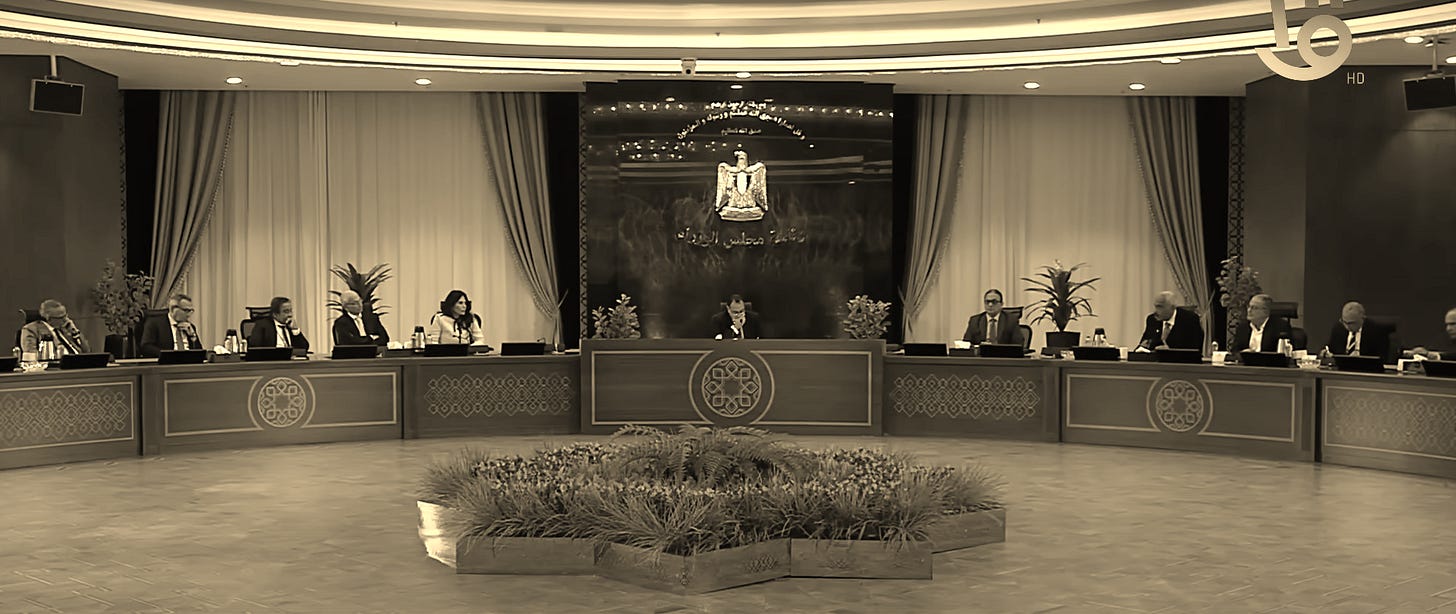Housing Policy Tracker 4 | January 2025
Three new real estate bodies, legal developments in rent, registration and construction, and NUCA and UDF accounts.
Welcome to the fourth issue of the Housing Policy Tracker!
In this issue you’ll read about:
Three New Official Real Estate Bodies Proposed or Established
Real Estate Development and Exporting Committee Established by Cabinet
Central Business Districts Law Drafted
Agency to Manage and Operate Downtown Cairo Proposed
Tenure, Legalization & Construction Laws
Old Rent Decontrol Draft Delayed
Improving Real Estate Registration… to Attract Foreigners
Amending Building Law to Accommodate Villages’ Housing Needs…
…And Stipulating 20 Acre Plots’ Permits be Reviewed by the Military
Urban Redevelopment & Real Estate
NUCA Final Accounts Drafted for 2023-2024…
…UDF Invests LE72bn in For Profit Housing
589,000 Applicants Compete over 78,000 Social Housing Units
Note: In case some links fail, please try them on the WayBack Machine, or in some cases Archive Today.
Three New Official Real Estate Bodies Proposed or Established
Real Estate Development and Exporting Committee Established by Cabinet
Following up on the PM's investors’ meeting last month [December Bulletin], Mostafa Madbouly established six Specialized Advisory Committees to “enhance public private communication and partnerships… as well as enhancing the role of the private sector in the policymaking process”. They include a Real Estate Development and Exporting Committee (export meaning selling real estate in foreign currency to Egyptians abroad or foreigners) in addition to five other committees: Economic, Export Development, Digital Economy and Entrepreneurship, Tourism Development, and Political Affairs committees.
The nine, all male, real estate committee includes some of the largest landowners covering both the private and public sectors, as well as parliament. Private sector executives include Yassin Mansour (Palm Hills Development Co), Naguib Sawiris (Ora Developers), Mahmoud Al-Gammal (New Giza for Urban Development), Ahmed Shalaby (Tatweer Misr for Urban Community Development), Amr Soliman (Mountain View Developments), and Ashraf Abdelkhalek (Talaat Mostafa Group Holding). Stradling the private sector, parliament, and the real estate lobby is Tarek Shoukry, CEO of Arabia for Real Estate Development, MP and deputy of parliament’s Housing Committee, and head of the Real Estate Chamber within the Federation of Egyptian Industries (FEI). On the public sector side are Khaled Abbas, CEO of the New Capital’s owner, Administrative Capital for Urban Development (ACUD) jointly owned by the Ministry of Defence and the Ministry of Housing's New Urban Communities Authority (NUCA). Amgad Hassanein represents the Housing and Development Bank (HDBK), a listed state-owned bank controlled by NUCA, and which co-own high-end developers City Edge and Hyde Park, among others. Further blurring public-private lines, all ‘private’ developers bar one have large tracts of their land-banks in co-development deals (read public private partnerships) with NUCA.
In a later statement about the advisory committees, PM Madbouly commented on how it is said that the government gives the real estate sector significant attention despite claims it is not a productive sector. However, Madbouly added that he is biased towards it given his background [as housing minister, and before that a career urban planning expert], stating how there are many countries whose economies are based on real estate, and how he was surprised that Egypt’s share of global real estate exports was only 1.8%, even though Egypt is considered a ‘tiger’ in the sector. To that end the PM outlined the main aim of the new committee as one that will help create a boost in real estate exports to attract foreign currency for the state.
The committee, whose members only produce luxury and ultra luxury real estate, could not reflect these aims any better. And while it could be successful in its stated aims, this will most probably exacerbate key housing challenges that residents face, especially the lack of affordable housing. By aiming to sell more real estate to Egyptian expats and foreigners, this policy puts more local residents in unfair competition with the stronger buying power of foreign currency, which will see local homes as a ‘cheap’ investment, against locals’ weaker Egyptian Pound . As many governments around the world have been responding to growing pressure from their people against their real estate export policies, and have started to curb golden visas, sales to foreigners, and short term holiday lets, Egypt is heading in the opposite direction.
#SpecializedAdvisoryCommittees #ExportingRealEstate
Central Business Districts Law Drafted
PM Mostafa Madbouly stated that a draft law governing the establishment of Central Business Districts (CBD) has been finalised. The law stipulates the establishment of a General Authority for Central Areas for Finance and Business that would be affiliated to the Cabinet and chaired by the Minister of Investment. The new authority would be tasked with administering CBDs and creating a competitive and regulatory commercial investment environment.
Many cities worldwide have what are known as central business districts, or CBDs, which either developed organically over time, holding concentrations of private sector headquarters, and in some cases stock markets and financial regulatory bodies. With the rise of new districts and towns, some newer CBDs have been designed from the outset to be so, though in most cases fall under regular local administrative frameworks. The CBDs envisioned under this draft law, which is yet to be published, seem to be modelled along special economic zones (SEZ), an evolution of industrial free zones but for non-industrial businesses and services, where exceptional tax and regulatory legislation apply to businesses located there.
Keep reading with a 7-day free trial
Subscribe to BEO Housing Policy Tracker to keep reading this post and get 7 days of free access to the full post archives.




